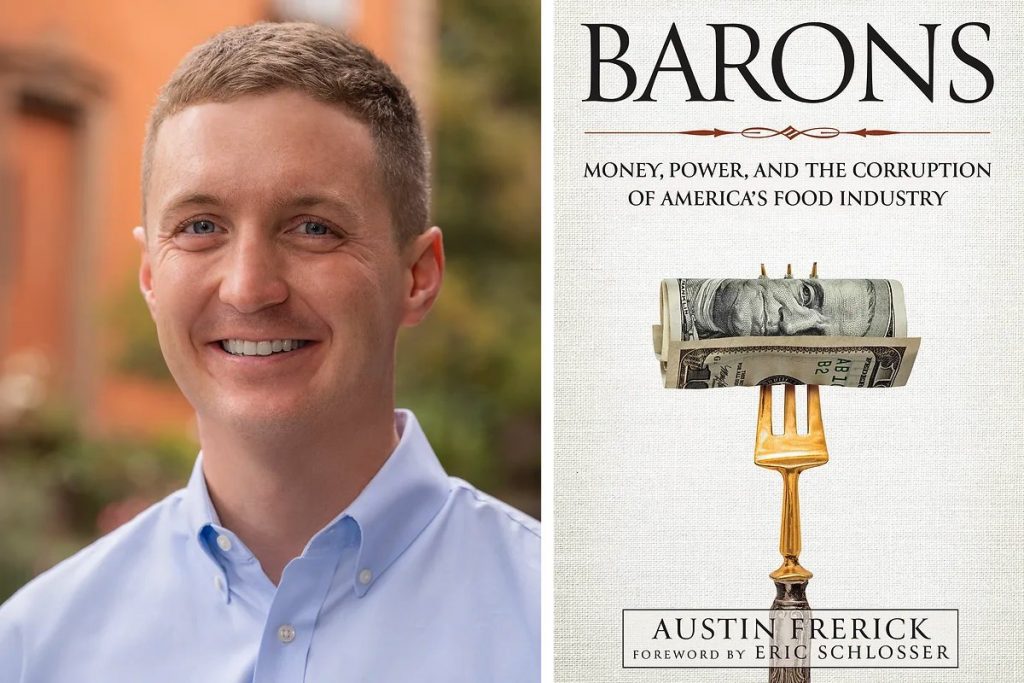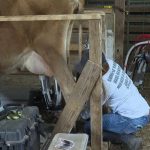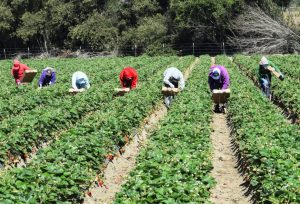
In his new book, the Iowa native and competition expert exposes the system that has allowed seven families, including those behind Cargill, JBS, Driscoll’s, and Walmart, to build enormous power.
With his new book, Barons: Money, Power, and the Corruption of America’s Food Industry, Austin Frerick set out to unravel the tangled history of today’s agriculture industry, while simultaneously pursuing the answer to a very personal question: What happened to the vibrant, diverse Iowa he once called home?
“The state is blessed with some of the world’s best soil: ‘black gold,’ which, coupled with consistently good rainfall, makes for ideal farming conditions,” writes Frerick, a fellow at Yale University’s Thurman Arnold Project, a research effort focused on competition policy and antitrust enforcement. “I wanted to understand how this blessing has, over the past 40 years, turned into a curse.” How, he wonders, has the countryside become “so industrial that it no longer feels like countryside at all?”
But Barons, which took Frerick five years to write, is not a memoir. It’s a detailed look at seven families that have risen to power within the food industry and, more importantly, the story of the system that has allowed them to concentrate power, reap enormous profits, and shape our political landscape. He digs into the policies that allowed white farmers to displace farmers of color in the 20th century and contrasts the “New Deal Farm Bill”—his term for the bill as it was originally intended—with today’s “Wall Street Farm Bill.”
“I wanted to call attention to how intentional the rise of industrial farms was by the business community in Iowa, as well as the failure of public servants like Vilsack to do what voters had wanted.”
“I refer to these people as ‘barons’ to hearken back to Gilded Age robber barons such as John D. Rockefeller and J. P. Morgan because I believe that we are living in a parallel moment when a few titans have the power to shape industries,” writes Frerick, in the book’s introduction.
Some of the barons, like the Waltons and the Cargill-MacMillan family, may be familiar to his readers. But most—including Driscoll’s “berry barons” J. Miles and Garland Reiter; Joesley and Wesley Batista, the brothers behind the Brazilian beef company JBS; and the Reimanns, the German family behind JAB Holding Company, the fast-growing company that has come to dominate the U.S. coffee industry in a single decade—will likely be new.
Civil Eats spoke to Frerick recently about several of the barons, the systemic levers that have allowed food monopolies to thrive, and why he thinks lawmakers should completely rethink the farm bill.
There have been a lot of books about the food system. What did you think was missing from the existing canon and why did you want to write this book?
I didn’t start off with wanting to write a book. I wanted to write about what I’ve seen happen to Iowa. In 2021, I wrote an article [about “hog baron” Jeff Hansen and his company Iowa Select Farms] with Charlie Mitchell. And that started over beers in a bar in Des Moines where a political operative told me the largest donor to the governor in the big race that year was this hog farmer who had given her $300,000.
He had a private jet, and the rumor was that it had “when pigs fly” painted on the side of it. To me, that just said everything about what had happened in my home state in my lifetime, how [a few big agribusiness families] run the state government to the detriment of the environment—and our communities. That article did well online; a whole lot of people reached out to me afterwards.
And I realized that missing in the larger story of the rise of Iowa hog confinement in the media is the fact that people there did fight them for years; there was a rural rebellion—and they lost. In these little towns of 2,000 people, hundreds packed gyms, trying to organize against hog confinements. When [current Agriculture Secretary] Tom Vilsack ran for governor in 1998, he even campaigned against them.
Then, after he won, he oversaw the largest expansion of confinements in Iowa history. So, I wanted to call attention to how intentional the rise of industrial farms was by the business community in Iowa, as well as the failure of public servants like Vilsack to do what voters had wanted. And after working on that story, I realized the baron framework was a powerful way to tell larger structural stories.
You write, “I was born near a Cargill soybean mill and went to church near a Cargill corn mill. I even played soccer next to a Cargill grain elevator.” Yet, like most people, you didn’t know how powerful the company was—it is now the largest private company in America—until much later.
It is truly mind-blowing how massive they are and how little attention they’ve gotten. And it’s because they’re the middleman. The Cargill-MacMillans are like your classic smart monopolists. The best monopolies are the ones that fly under the radar.
Cargill also doesn’t give donations—it funnels money through other people. Ninety percent of the company is owned by one family. That is an insane amount of money and power. I would argue they’re probably some of the scariest barons.
Can you speak to how the farm bill has changed since its inception? You describe what began as a “New Deal Farm Bill” and detail the events that transformed it into what you call the “Stock Market Farm Bill.” How are those different?
The “New Deal Farm Bill” was about managing production. What we saw during the Dust Bowl and after the crash of agriculture markets after World War I was the result of markets overproducing. Farmers were pushing their land [to produce as much food as possible] just to keep their land even though it was cratering the market. The “New Deal Farm Bill” was an attempt by the federal government to try to figure out a balance between producing enough but understanding that the soil, air, water, etc., are common goods, and we shouldn’t push our lands too hard. And the two programs were tied together; in order to get farm subsidies, you had to engage in conservation programs. The carrot and stick were interlocked. And there were caps—each farm could only get so much in subsidies.
Fast forward to what I call the “Wall Street Farm Bill.” It is designed specifically to incentivize overproduction of grain. If you grow carrots, you don’t really get anything. (The dark joke I keep telling after writing this book is that the only farmer really on the free market is the CSA vegetable farmer.)
That push to produce corn in places like Iowa led to the ethanol industry. Farmers overplanted corn, and that pushed a lot of animals off the land. But it didn’t happen all at once. It’s like what we’ve seen in the last few decades of deregulation in America—there has been this slow removal of checks and balances. Now you have [farm bill-funded] conservation programs that come out of the Dust Bowl and are now being used to finance hog confinements, a fact that Civil Eats has reported on extensively.
The “New Deal Farm Bill” did some important things, but it was ultimately a bill to support white farmers. Ricardo Salvador [a Civil Eats’ advisory board member] helped me understand that the system has long been broken for farmers of color. Black sharecroppers did all the farming in the South. The white people were just the landowners who pocketed money and kicked Black people off the land.
So, rather than romanticize the “New Deal Farm Bill,” I think we should be looking forward. Because at the end of the day, agriculture in America is rooted in genocide and slavery. The question is: How do we incorporate the awareness we have now and move to a better system?
The GOP is often associated with leading the shift toward free-market capitalism in the ’80s and ’90s, but you highlighted the way the Clinton administration played a rather large role in creating the policy environment that has allowed the barons you write about to thrive. How should we be thinking about the role of neoliberalism in all this?
It was both Republicans and Democrats that led to the system we have now. That said, it wasn’t equal. You still had people like Tom Harkin trying to do the right thing. And in Iowa, the only people standing up against the proliferation of hog confinements were the Democrats. But, yes, you had [Democratic leaders] like President Clinton and Vilsack, who is a former lobbyist, willing to do the bidding of corporate America.
“Today, we have children working in our slaughterhouses, and there are no consequences. I haven’t seen something in modern American history so ripe for bipartisan reform than the meat industry.”
When JBS [bought dozens of meat processing companies in the U.S. and drove down prices for cattle ranchers], Vilsack didn’t stop them. The company will just keep pushing the limit, because they only get slapped on the wrist. They get fined and it’s considered part of the cost of doing business.
There are plenty of politicians out there—take Terry Branstad, governor of Iowa, or [former Agriculture Secretary] Sonny Purdue. They don’t pretend to be reformers. They’re there to do the bidding of corporate America. Vilsack is a different story.
Today, we have children working in our slaughterhouses, and there are no consequences. I haven’t seen something in modern American history so ripe for bipartisan reform than the meat industry. Vilsak had everyone [on his side]. He had Republican-leaning ranchers, the mostly Latino workers, and the consumers being gouged in the store.
All these non-American companies have moved in [in the last decade], and the largest one, JBS, admitted to bribing its way to monopoly status. And Vilsack couldn’t do anything? On top of it, the markets have gotten more concentrated during his second stint. JBS was an intentional creation of the Brazilian government. They realized they were over being shortchanged by international companies, so they decided to create their own monopoly. That was very much an intentional development strategy. But you let concentrated power happen and guess what? It corrupted the political system. And that’s why you also saw the rise of [former Brazilian President Jair] Bolsonaro.
You describe the Biden administration’s investment in small- and mid-scale meat processing to promote competition as “dumping money on Ask Jeeves and wishing it luck in competing with Google.” Can you say more about that? There are people who have attached a fair amount of hope to those investments.
To my knowledge, there has never been an example where markets have been de-concentrated by throwing government money at them. You have these meat monopolies, which have shown how ruthless they are—someone might even argue they’re quasi-mafia capitalists. Do you think they’re going to let an ounce of market share go to a local mom-and-pop butcher market space? No. There are a lot of people excited to get free money from the government to go build [or expand meat processing facilities].
But common sense just tells you the two most likely outcomes. One: they will just create more niche products for the Whole Foods Consumer. And, honestly, that has been the story of the food system for the last 30 or 40 years. Two: Most people assume these facilities will go broke in a few years. Then the big meat companies can buy them for pennies on the dollar. Vilsack will be a lobbyist again at that point. And he got the media he wanted about pretending to care about the little guys.
Here in California, the investments seem to have mostly gone to strengthen and expand existing operations, and there are some early signs that it might help build up the market for regenerative beef alongside institutional procurement.
You have some decent regulators there. But much of the “change the food system with your fork” framework is just concerned about the Whole Foods class. My goal is to change the food in Dollar General and Walmart. None of this does that.
Walmart has made an aggressive move into [producing its own] meat and dairy, and that says everything. My understanding is they did that because they were being gouged by the big meat monopolies, these [other] barons. Walmart is known as one of the most ruthless players, and they weren’t happy. Walmart didn’t fully make a vertical play like Costco did with chicken; it created its own companies to gain cost insights. So, now it knows the cost of beef production, and that way when it negotiates with the [other] barons, they can’t screw Walmart over. That’s where we are now: We’re depending on the world’s richest family to police the markets for themselves.
You write about the way that Walmart has driven prices down to such a degree that the companies who make the food it sells must find other ways to eke out a profit.
Yes, that’s true. My favorite disturbing fact about Walmart is the company’s 30 percent rule, because that’s so much about power. [From Barons: “The company is very cognizant of the power asymmetry between it and its suppliers. It requires that no more than 30 percent of their sales come from Walmart. This rule may seem counterintuitive at first, but an industry expert told me that Walmart implemented it to manage its own supply chain risk. It knows that if suppliers cross that threshold, they are at risk of going out of business because Walmart is such an unprofitable and difficult client.”]
The 30 percent rule shows us how the company just keeps tilting the field toward its own advantage.
In the book’s concluding chapter, you point to the existing tools for dismantling the system in which these barons are able to maintain so much control. Where do you see possibilities for change?
I think the heartland in America hasn’t grappled with what the shift to electric vehicles will mean for us all. It is like watching Wile E. Coyote run full-speed toward a cliff. Cars are moving to batteries; that’s going to happen. And it stands to destroy the ethanol industry—one of the largest markets for corn.
Right now, so much wealth in the Midwest is predicated on land wealth. Farmland is worth over $23,000 an acre right now in Iowa. That will plummet if half the corn’s no longer in use. We’re gonna face the death of ethanol soon. The question is what we do with that?
My silver lining is that we could use that moment to put animals back on the land. Because we’re playing with fire by having so many genetically similar animals packed into these metal sheds. We’re just asking for [more] disease.
“The problem with USDA now is it acts like a chamber of commerce, or a promotional agency for the barons. And with every metric—except corporate profits—they’ve failed …”
You also make a radical set of proposals in the last chapter to scrap the farm bill, completely rethink federal support for farms, and re-organize U.S. Department of Agriculture (USDA). Can you say a little about why?
I think the current farm bill is just too broken. The 2024 Farm Bill will uphold the status quo. They’re going to try to ram it through in the lame duck session after the election. That’s pretty clear at this point. The current “Wall Street Farm Bill” really doesn’t change between [reauthorizations] in my opinion. They add little pilot programs, they do little tweaks, and there’s usually a little bit more deregulation. But I really think a bigger conversation needs to be had over putting the farm bill out to pasture and stripping USDA for parts.
I think a lot of reformers in the food space get played. What Vilsack types do is they bring them into the room, they let them say their peace. And then they can go back and tell their funders, “We had a meeting with the ag secretary.” And the status quo is maintained. That is what you see over and over. Secretary Vilsack oversaw the death of the family hog farm as governor of Iowa, and then he oversaw the death of the family dairy farm as Secretary of Agriculture, and that happened mostly because he didn’t do anything. If you’re not playing on a level playing field [as a farmer] at some point, you can’t play anymore.
I understand food reformers are trying to [make change] day to day, but once in a while, you have to step back and look at the bigger picture. This [bill] was built in a different world. It is so corrupted and corroded. We need to rethink it. And the U.S. Department of Agriculture (USDA) goes back to the Civil War. It’s not a bad thing to look at reorganizing the system. Let’s put food research under Health and Human Services. Why does USDA have antitrust authority? We should give that to the FTC.
The problem with USDA now is it acts like a chamber of commerce, or a promotional agency for the barons. And with every metric—except corporate profits—they’ve failed: The farmer’s share of the dollar is at an all-time low. One in 10 Americans works in the food system, and the way workers are treated is appalling. And by health standards, Americans are not doing well. It’s hard to make a case that they should continue as-is based on this checklist of failures.
I want readers to understand that the system we have now is radical. It is radical that one man in Iowa raised 5 million hogs a year. The reforms in that last chapter, a lot of it is going back to the way systems used to be—like putting animals back on land. That is not radical; that’s how animals have lived for most of their existence. I understand that the barons and their lackeys will frame me as a radical, but no, it is their corporate capitalist system that is incredibly radical. And you can’t talk about fixing or reforming something unless you have an honest conversation about where it’s at.
This interview has been edited for length and clarity.
You can now read the most important #news on #eDairyNews #Whatsapp channels!!!
🇺🇸 eDairy News INGLÊS: https://whatsapp.com/channel/0029VaKsjzGDTkJyIN6hcP1K




















